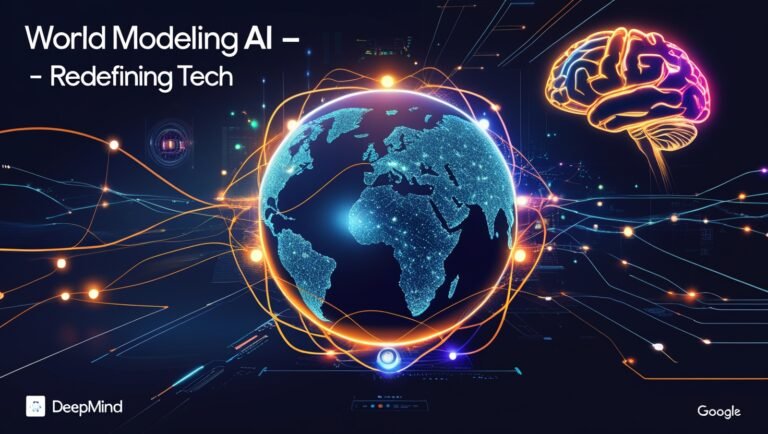What if your favorite video game worlds could build themselves? Or robots could train like people, in hyper-realistic, simulated environments? This isn’t the stuff of sci-fi anymore—Google is diving headfirst into this frontier with its new ‘world modeling’ AI team. Buckle up; this is about to get exciting.
What’s All the Buzz About?
In January 2025, Google DeepMind announced an ambitious new initiative: to build advanced AI capable of simulating the physical world. Led by Tim Brooks, a former OpenAI researcher, this team is tasked with crafting AI “world models.” These models are groundbreaking—they simulate interactive, game-like environments and real-world scenarios not just for entertainment but also practical applications like robot training and problem-solving.
Why is this significant? It’s Google’s play to dominate the race toward Artificial General Intelligence (AGI), systems so smart they can handle any task humans can (and maybe more).
What Are “World Models” and Why Do They Matter?
At their core, world models are AI systems designed to mimic aspects of the physical world in real-time. Think virtual landscapes that evolve dynamically—like simulating cityscapes or crafting robot training hubs where machines experiment safely before working in the real world.
The applications are diverse:
- Gaming and Entertainment: Imagine video games where the entire environment morphs based on your choices. Google is aligning this with projects like their Genie AI, which already creates playable 3D worlds.
- Robot Training: Robots can learn and fail repeatedly in virtual environments, minimizing risks and costs. Perfecting this could accelerate the use of robots in healthcare, construction, and beyond.
- Simulation for Problem-Solving: From climate modeling to disaster management, these AI-powered replicas could test solutions before intervention.
Google’s Tech Arsenal: The AI Dream Team
Google’s DeepMind already leads in AI breakthroughs, previously wowing the world with AlphaGo and AlphaFold. Here’s how they’re stacking their deck:
- Gemini Models: These flagship systems handle everything from image analysis to text generation. Think of them as Google’s answer to ChatGPT but with more advanced capabilities.
- Veo Video Generator: The go-to for lifelike video creation, useful for everything from ads to Hollywood.
- Genie AI: Their experimental AI that creates limitless, playable 3D worlds in real-time.
By combining these projects under one roof, the new team will take Google’s AI potential to jaw-dropping heights.
Insert image of Google DeepMind’s logo alongside visuals of interactive AI-generated 3D environments.
Who’s Steering the Ship?
Tim Brooks, a key player in OpenAI’s video generator project, Sora, is leading this charge, having jumped ship to Google DeepMind last October. He places brooks-level emphasis on scaling AI training:
“DeepMind has ambitious plans to make massive generative models that simulate the world,” Brooks shared on X (formerly Twitter).
But Brooks isn’t alone. The team is also drawing insights from powerhouse AI researchers and engineers across Google’s Gemini, Veo, and Genie divisions.
The Bigger Picture: AGI and the AI Arms Race
Let’s not sugarcoat this—Google isn’t just doing this for fun (or the robots). This is a direct move in the AGI arms race. Companies like OpenAI, NVIDIA, and startups like Fei-Fei Li’s World Labs are fiercely competing to dominate the space. AGI, seen as the “Holy Grail” of AI, offers transformative power in virtually every industry—healthcare, finance, education, and beyond.
Google’s edge? Ownership of massive compute resources and its ability to integrate AI projects seamlessly with platforms like YouTube for training data. Of course, this hasn’t come without controversy. Concerns about copyright infringement and ethical use of training data on platforms like YouTube are unresolved debates.
Will This Change Big Tech Forever?
Absolutely. Google’s AI ambitions signal a shift in how humans interact with technology:
- Movies, video games, and art may soon be co-created by AI, reducing manual labor for creators.
- Robots will evolve faster, becoming useful in areas previously deemed impractical.
- Education, research, and healthcare will benefit immensely from cost-effective simulations.
But it’s not all rainbows and holographic unicorns. The rise of such powerful AI stirs debate in areas like job automation and the ethics of AI replacements in creative fields. A 2024 study by the Animation Guild predicts 100,000 U.S. creative jobs could be disrupted by AI by 2026.
Comparison Table: Google’s World Modeling AI vs. Competitors
| Feature | Google’s AI Team | OpenAI | NVIDIA Cosmos |
|---|---|---|---|
| Focus Areas | Gaming, robotics, AGI | Text, multimodal AI | Robot development, simulation |
| Key Advantage | Integration with Gemini, Veo, Genie | Early-mover advantage | Cutting-edge simulations |
| Controversies | Copyright, workforce impact | Ethical AI misuse concerns | Licensing issues |
FAQs
1. What is Google’s world modeling AI team focused on?
The team aims to build AI systems that simulate the physical world, with applications in gaming, robotics, and problem-solving.
2. Does this mean robots will replace humans?
Not entirely, though AI will likely handle repetitive and dangerous tasks, opening new opportunities for humans to focus on more creative endeavors.
3. What makes Google’s approach unique?
Google is leveraging its existing AI tools like Gemini and Genie into this effort, creating a more integrated approach than its competitors.
Closing Thoughts: Is Google Redefining the Future?
Google’s newly-formed ‘world modeling’ AI team could mark the dawn of a new tech revolution. From redefining video games to unlocking robots’ potential, this initiative is creating new dimensions—literally.
The questions left? Can Google’s ethical, workforce, and copyright challenges be resolved? Whatever side you’re rooting for, one thing’s clear: the AI future is knocking on our screens, and we’re strapped in for the ride.
So, what do you think? Will this AI innovation make our lives richer, or does it feel a bit like stepping into a sci-fi movie? Share your thoughts in the comments below!

